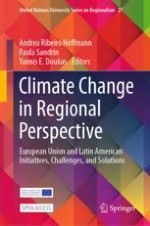This Open Access book addresses climate change in Europe and Latin America from a comparative regionalism studies (CRS) perspective. Written by an international team of scholars and experts, chapters critically analyze proposals for mitigating climate change while contributing to the mutual understanding about the issues at stake across regions. The book is divided into three main sections. In the first section, authors discuss EU and Latin American cooperation, negotiations, and perspectives on climate change, exploring their agendas, the interests and key challenges at the global, regional and interregional levels. The second section focuses on the challenges to finance development and a greener economy. The third section explores new green solutions to climate change in the agriculture sector and initiatives such as nature-based solutions to climate change and best practices. Providing policy oriented solutions for combatting regional climate change at a critical juncture, this volume will be of interest to researchers and students of international relations, international law, and environmental politics, as well as public officials and climate change activists.
